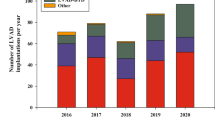Abstract
Purpose of Review
Heart failure is an important healthcare issue because of its high prevalence, mortality, and morbidity. Advanced heart failure therapies have improved significantly over the years with improved outcomes. Heart transplantation remains an elusive treatment option for most patients; hence, the need for alternative therapy has given rise to the use of mechanical circulatory support (MCS) devices, initially as bridge to transplantation, but with more recent use as destination therapy. This review focuses on the intricacies of establishing a successful left ventricular assist device (LVAD) program for destination therapy in the setting of a growing anticipated need for wider availability of such treatment options.
Recent Findings
Guidelines have established the role of MCS in patients with advanced HF refractory to optimal guideline-directed medical therapy (GDMT) and cardiac device interventions. Multiple studies have shown generational improvement in the overall safety profile of MCS devices with the use of newer devices for destination therapy showing improved outcomes.
Summary
Heart failure is a growing cardiovascular problem with an anticipated growing need for advanced HF therapies including MCS devices. A model of shared care LVAD to destination therapy implanting site should be considered as a strategy to start a successful LVAD program.



Similar content being viewed by others
References
Papers of particular interest, published recently, have been highlighted as: • Of importance •• Of major importance
Heidenreich PA, Albert NM, Allen LA, Bluemke DA, Butler J, Fonarow GC, et al. Forecasting the impact of heart failure in the United States: a policy statement from the American Heart Association. Circ Heart Fail. 2013;6(3):606–19. https://doi.org/10.1161/HHF.0b013e318291329a.
Murray JJ, Packer M, Desai AS, Gong J, Lefkowitz MP, Rizkala AR, et al. Angiotensin-neprilysin inhibition versus enalapril in heart failure. N Engl J Med. 2014;371(11):993–1004. https://doi.org/10.1056/NEJMoa1409077.
McMurray JJV, Solomon SD, Inzucchi SE, Køber L, Kosiborod MN, Martinez FA, et al. Dapagliflozin in patients with heart failure and reduced ejection fraction. N Engl J Med. 2019;381(21):1995–2008. https://doi.org/10.1056/NEJMoa1911303.
Bleumink GS, Knetsch AM, Sturkenboom MCJM, et al. Quantifying the heart failure epidemic: prevalence, incidence rate, lifetime risk and prognosis of heart failure: the Rotterdam study. Eur Heart J. 2004;25(18):1614–9. https://doi.org/10.1016/j.ehj.2004.06.038.
Rose EA, Gelijns AC, Moskowitz AJ, Heitjan DF, Stevenson LW, Dembitsky W, et al. Long-term use of a left ventricular assist device for end-stage heart failure. N Engl J Med. 2001;345(20):1435–43. https://doi.org/10.1056/NEJMoa012175.
Colvin M, Smith JM, Skeans MA, et al. OPTN/SRTR 2015 Annual Data Report. Heart Am J Transplant. 2017;17:286–356. https://doi.org/10.1111/ajt.14128.
Khush KK, Cherikh WS, Chambers DC, Goldfarb S, Hayes D Jr, Kucheryavaya AY, et al. The International Thoracic Organ Transplant Registry of the International Society for Heart and Lung Transplantation: thirty-fifth adult heart transplantation report-2018; Focus Theme: Multiorgan Transplantation. J Heart Lung Transplant. 2018;37(10):1155–68. https://doi.org/10.1016/j.healun.2018.07.022.
Han JJ, Acker MA, Atluri P. Left ventricular assist devices. Circulation. 2018;138(24):2841–51. https://doi.org/10.1161/CIRCULATIONAHA.118.035566.
Rogers JG, Pagani FD, Tatooles AJ, Bhat G, Slaughter MS, Birks EJ, et al. Intrapericardial left ventricular assist device for advanced heart failure. N Engl J Med. 2017;376(5):451–60. https://doi.org/10.1056/NEJMoa1602954Findings from this study showed the difference in outcomes based on vastly different pump designs and paved the way for improvement in future pump designs in order to reduce the rate of complications.
Mehra MR, Uriel N, Naka Y, Cleveland JC, Yuzefpolskaya M, Salerno C, et al. A fully magnetically levitated left ventricular assist device—final report. N Engl J Med. 2019;380(17):1618–27. https://doi.org/10.1056/NEJMoa1900486Findings from this study showed steady improvements in the rates of complications with newer generation of LVAD design, mainly driven by improved rates of stroke and need for reoperation due to pump failure.
Gajanan G, Barn K, Thomas J, Garrido M, Morris R, Prentice T, et al. Shared care: a novel approach to left ventricular assist device (LVAD) implant follow up. J Am Coll Cardiol. 2020;75(11_Supplement_1):774. https://doi.org/10.1016/S0735-1097(20)31401-7Findings from this study showed the success of a shared care approach in setup of a LVAD implantation program with successful outcomes.
Author information
Authors and Affiliations
Corresponding author
Ethics declarations
Human and Animal Rights and Informed Consent
This article does not contain any studies with human or animal subjects performed by any of the authors.
Conflict of Interest
Dr. Moshiyakhov reports Critical Care Advisory Board Consultant-ABIOMED. Dr. Barn reports being a consultant for Abbott. The other authors declare that they have no conflict of interest.
Additional information
Publisher’s Note
Springer Nature remains neutral with regard to jurisdictional claims in published maps and institutional affiliations.
This article is part of the Topical Collection on Heart Failure
Rights and permissions
About this article
Cite this article
Shah, M., Hafeez, Y., Burns, P. et al. Shared Care to Destination Therapy Left Ventricular Assist Device Site: a Novel Strategy to Start a Successful Mechanical Circulatory Support Program. Curr Cardiol Rep 23, 112 (2021). https://doi.org/10.1007/s11886-021-01533-z
Accepted:
Published:
DOI: https://doi.org/10.1007/s11886-021-01533-z




